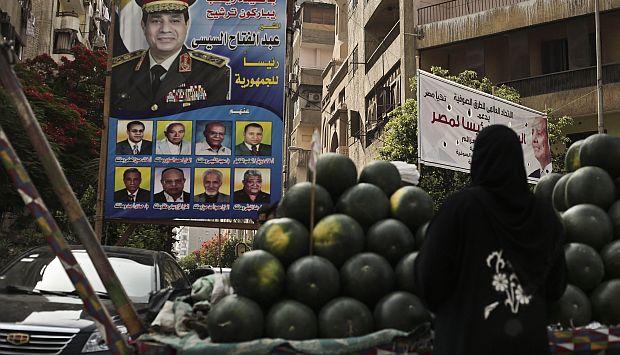Characterizing the challenges that will face Egypt’s Third Republic, which will begin with the announcement of a new president following the end of voting today, Reuters issued a report last week quoting the deputy chairman of the Federation of Egyptian Industries, Tarek Zakaria Tawfiq. In the report, Tawfiq says that Egypt’s new president must act: “Your back is against the wall. Either you reform or you fail and you get a third revolution.”
More importantly, the report quotes a number of prominent Egyptian businessmen whose companies benefit from energy subsidies about their ideas for addressing the structural problems facing Egypt’s economy, not least unemployment and the growing budget deficit. These business figures are well aware that their future is tied to securing a healthy economy. Reflecting this, one businessman said: “We need the masses to be stable. We cannot work in the situation where we live on our own and just grow and make money and live our own lives in closed compounds and the rest of the country is in shambles. Because the next day they’ll turn out in the streets . . . and everything will go chaotic.” The quotes from other Egyptian businessmen were similar.
The importance of all this talk is that it reflects the political maturity of Egypt’s businessmen and their awareness of their social responsibilities. They know that sustaining growth and profitability is difficult amid a turbulent political climate and that, although they are few in number, their economic influence is large, particularly in terms of investment, employment and the flow of the domestic economy.
Egyptian society has generally always held a negative view of entrepreneurship as a result of a legacy of “development plans” approved by the state, a phenomenon that has persisted for decades, not to mention other corrupt practices. Thus it is great that such statements are now being issued: it reflects the development of the vision of Egypt’s private-sector businessmen. They are now explicitly trying development and profitability with resolving social problems, expressing a desire to contribute to political and economic reform.
We can monitor the crystallization of this awareness of the urgent economic challenges Egypt is facing among various sectors of society. The challenge of economic reform is one of the most important things facing the new republic, amid other burdens that it must bear. But there is now a realization that there is no other alternative to swallowing this bitter pill. Egypt is a country with a population of more than 90 million, and its needs reflect its size.
This pressing need to take action and carry out these urgent reforms can perhaps explain the current government’s move—even before the results of this week’s election were announced—to reduce fuel subsidies by 22 percent in the budget for 2014–2015. This aims to reduce the burden of fuel subsidies, which accounts for 20 percent of state spending. All in all, approximately three-quarters of Egypt’s annual budget is spent on subsidies, public sector salaries and servicing public debt—leaving little left over to allocate on other services more important for development, such as education, healthcare and infrastructure.
The past three years have been defined by political unrest and unwise economic practices, resulting in an economic decline. The most prominent feature of this economic decay is the loss of tourism revenue, the closure of factories and an increase in unemployment. These structural economic problems have existed for decades without structural solutions being put forward to confront them. These problems now go beyond the kinds of stopgap measures that have previously been put forward to deal with them, which in turn have created new problems. Without facing this reality, there will be no serious solution.
The scenes on the first day of the presidential election reflect the public desire to move forward beyond this transitional phase and give the next president a popular mandate. He will need such a mandate to restart the reform process. This is a mandate that Egypt’s Third Republic—which still must complete the formation of other institutions, such as parliament—will similarly require.
